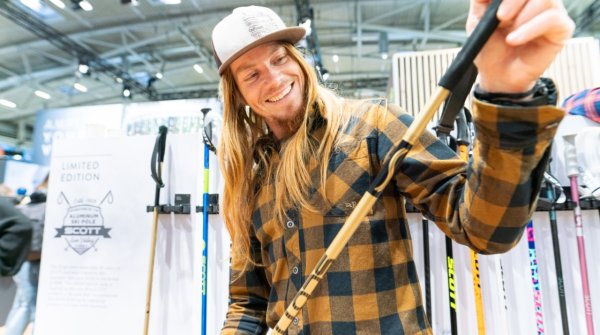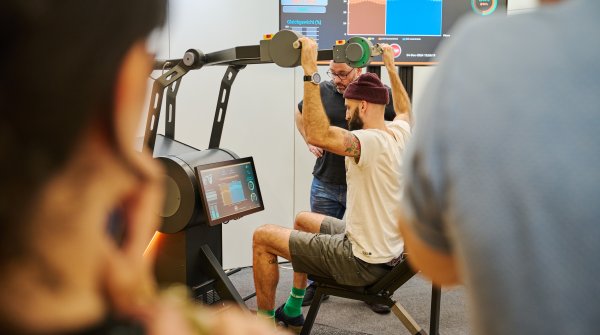Adventurer Jonas Deichmann has big plans for his next project. The race starts on June 28 in New York. He will cycle a total of around 5,500 kilometers to Los Angeles and then set off the next day to run back to New York. On average, he will complete one ultramarathon per day. He plans to arrive back in the Big Apple in early November - after more than 5,000 kilometers on foot. "I've always wanted to run across the U.S., so this is still unfinished business for me"says Deichmann about his choice of route. That's because he had to divert to Mexico for his 120-triathlon around the world due to the Corona pandemic.
This time, too, the adventurer is on the road without a support team, transports his equipment on a gravel bike or in a special running trailer, and spends most of the night outdoors. He does not take the fastest possible route, but follows small roads with some highlights like Death Valley, Monument Valley and the Rocky Mountains. "From snowfall in the Appalachians to extreme heat in one of the hottest places in the world, it will be all there", says the extreme sportsman. But the biggest challenge will not be the mountains, but the prairie. "Through Kansas it goes over 1,000 kilometers dead straight through an extremely monotonous landscape. On foot, that's three weeks and an enormous mental challenge.". In his own words, he is helped by the simple principles of his successes (which can be read in the book "The Candy Bar Effect").
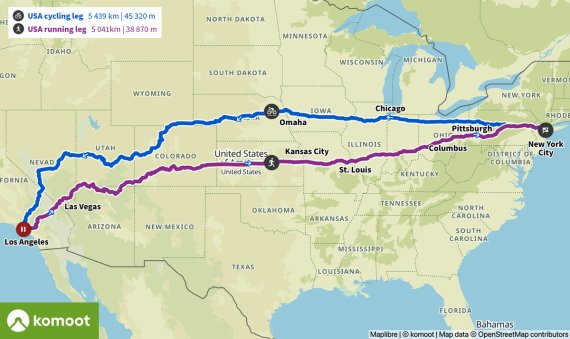
ISPO.com: The last time we talked was after your triathlon around the world, how have you been since then?
Jonas Deichmann: An insane amount has changed. Before, I was mainly known in the cycling bubble and now I was suddenly all over the media. On my previous adventures, I answered my few emails from inside the tent. And now I no longer have a small company. On top of that, I had a lot of speaking engagements with big companies, plus the work for the new book and the movie. Along the way, I added some smaller adventures: I've been to Ireland, Morocco, the Alps and Oman. I had to balance all that somehow - and then I'm also preparing for Trans America Twice.
So you don't want your company to go from record to record?
Of course, I have thought about hiring employees. But I don't want to do that at all. My father does my management and my brother helps out now and then. So we're a small family business, and that's just fine. Because I want to do my adventures. And if I have a huge team now and fixed costs and everything, then yeah, I'm not free anymore. So in the sense that I go cycling or running somewhere for half a year. The fixed costs run along with it, and then I would always have to immediately think about how I can market the adventure. That means I would then have a completely different perspective, then I would no longer be doing this out of my passion. And I would like to avoid that. Yes, things have to be taken away from me, but I don't want my business to get bigger.
Knowing what your goals are and how to achieve them is, after all, the topic of your new book, "The Candy Bar Effect." Which of the 24 impulses is actually the most important for you?
Well, the most important impulse for me, as the subtitle says, is to break down the big goals into small goals. Not to get discouraged by what's still in front of you, but to think about the next candy bar. And that's never far away. Whether it's food poisoning in the African desert, struggling with mud on Russian country roads, or severely aching legs in Baja California after my very first marathon, in these situations I don't focus on the big goal, but on small intermediate goals. I don't think: Now you've (only) completed 42 of a good 5040 kilometers, but simply have the next candy bar in mind. It is the next small goal that I want to achieve, I just have to hold out until the next reward. I've been following this strategy for a long time, probably since childhood, and have called it the candy bar effect.
Is there another impulse that has accompanied you for a long time?
Yes: just do it. That is, the hardest part is getting to the starting line. With adventures, you never know what's going to happen. But if you just stay in your comfort zone and don't change anything, then it's comfortable, but it's also boring. And that's why you just have to do it, take the first step. It's been that way with me for many years. I'm not hesitant, but when I want to do something, I just do it.

Your adventurous life seems to be quite risky for many people. But you plan very carefully and calculate your risk?
Yes, and it's not as dangerous as it might often seem from the outside. The most dangerous thing about my adventures is definitely the traffic. But we have that here, too. Statistically, driving a car is pretty dangerous and people do it without any concern. Cycling in traffic also has its dangers, but I wouldn't give it up now. I'll say this, as far as risk goes, there's one trait you definitely need to be an adventurer. That is: never to panic. And I never have. That means that even in a crisis situation, when it's dangerous, I still function rationally. If you don't have this quality, I would advise you to reconsider whether a life as an adventurer is right for you. Because there are always dicey situations, for example when I got into the dark while swimming on the open sea. If I panic there and my body no longer functions - then I'm dead.

Now it is rather impossible for most of us to live a life as an adventurer - how can we make our lives more adventurous?
That is a very, very important point. After all, it's not about doing a triathlon around the world, but for everyone something else is an adventure. Microadventures, for example, are a great way to make your life a little more exciting: Running up the nearest mountain for a change, weekend trips, smaller trips - just anything you're passionate about. The important thing is to start doing it. Because then the amazing thing happens, doors open.
Do your impulses apply equally to men and women?
Well, I didn't write my book for a specific target group. However, I have noticed that the impulse "Get to the starting line - the path is the goal" is sometimes more difficult to implement for women. It is often easier for us men to go our own way. I keep noticing - in the context of cycling - that many women are simply afraid to go on a cycling trip alone. I think this is fundamentally related to society and the gender roles that still exist. If a man says I'm going to cycle through India on my own, many say "cool" and "have fun". If a woman says that, then it's quickly said, "Oh, rad. Aren't you scared?"

You were recently on a bike tour in Oman with a female companion - how was that for you?
Well, I also think it's nice to be on the road with company. In the past, I've often had someone at my side, but it was usually my brother or a very close friend. Very important: It has to fit with the company. That means you have to talk clearly about the goals of the trip beforehand, especially if you are traveling for a longer period of time. Because if one wants to go on a casual vacation and the other wants to train, then it doesn't work. Or in my case: Is it winter right now and the next project far away or is the trip right before my season peak? And these considerations are independent of gender for the time being. If everything fits, then it's nice to be on the road with someone - even if I make certain compromises, of course, but that's okay.
But your female companion seemed to be able to keep up with you in terms of sport?
She's really fit, otherwise it wouldn't work anyway. And as I said, you have to have the same goals. That's the most important point on any longer trip, regardless of whether I'm accompanied by a man or a woman.
In 2021 your last book was published, in 2022 the film about your triathlon around the world, and now "The Candy Bar Effect" is coming to bookstores. What is your next goal?
I'm currently busy giving talks on the new book. From the end of June, Trans America Twice is waiting for me. I will be on the road for four and a half months. The duathlon will be a completely new challenge for me.
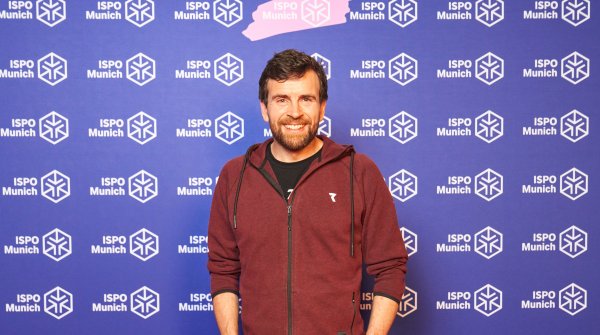
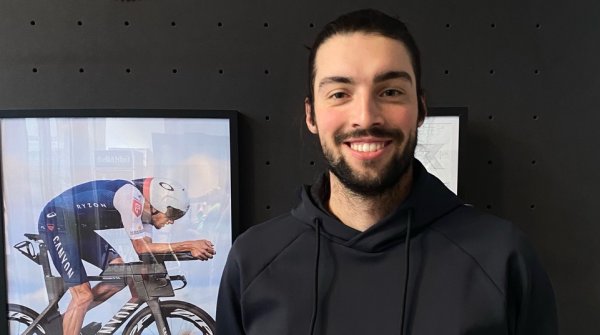 CompaniesWhy ISPO Brandnew Winner Ryzon Takes Off
CompaniesWhy ISPO Brandnew Winner Ryzon Takes Off
- Awards
- Mountain sports
- Bike
- Fitness
- Health
- ISPO Munich
- Running
- Brands
- Sustainability
- Olympia
- OutDoor
- Promotion
- Sports Business
- Textrends
- Triathlon
- Water sports
- Winter sports
- eSports
- SportsTech
- OutDoor by ISPO
- Heroes
- Transformation
- Sport Fashion
- Urban Culture
- Challenges of a CEO
- Trade fairs
- Sports
- Find the Balance
- Product reviews
- Newsletter Exclusive Area
- Magazine


